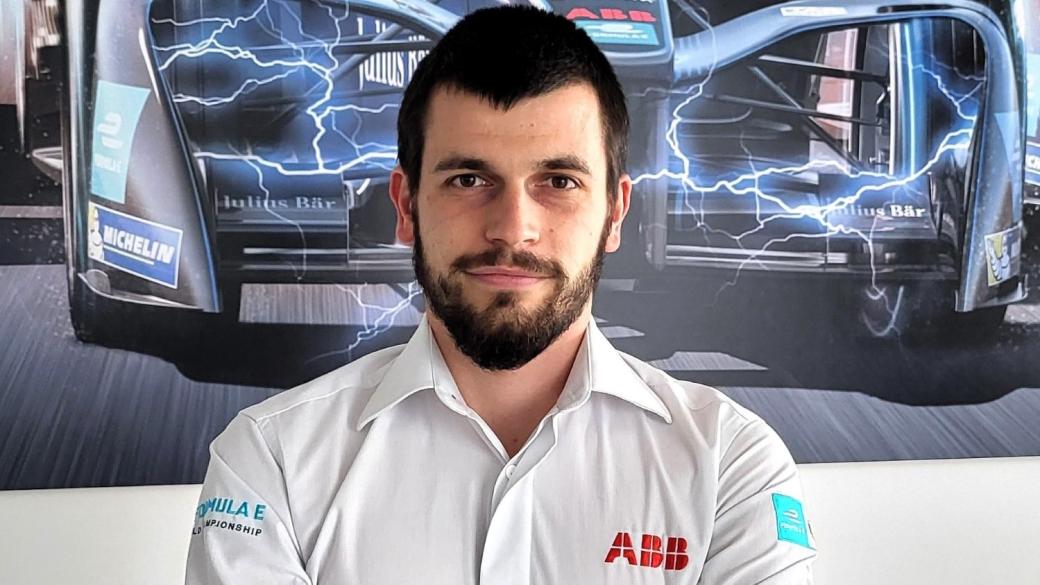EV charging network growth hinges on the new energy capacities
Charging stations combined with energy from renewable sources are an extremely good way to reduce the carbon footprint of electric cars

© ECONOMIC.BG / ABB
Bogomil Apostolov holds a master's degree in "Electronic systems for hybrid and electric vehicles" from Sofia Technical University. He has experience in various companies in the electricity sector in Bulgaria. His professional interests include charging infrastructure for electric cars, renewable energy sources, etc. He has been part of the ABB E-mobility team in Bulgaria since the beginning of 2023. He is responsible for technical issues regarding the operation and maintenance of ABB charging stations, as well as for marketing activities related to the products.
Mr. Apostolov, ABB has a leading position in the EV charging infrastructure and is actively involved in both the development of new technologies and their implementation. What is the pace of deployment of charging infrastructure in Europe? Is it good enough and what are the main issues facing network expansion?
ABB E-Mobility is a global leader in the market of electric vehicle charging stations, and from our experience and observations, we can say that the implementation of charging infrastructure is developing at a good pace and is directly related to the increase in demand for electric vehicles on the new car market. In recent years, ABB has increased its production capacity in the segment of fast-charging DC stations, becoming able to respond to increased market demand. A major problem for the expansion of charging station networks is the condition and power of the available power transmission and distribution network in the various locations and objects where there is a plan to install charging points.
Compared to other European countries, how does Bulgaria rank in the development of EV infrastructure?
In Bulgaria, the massive development of the charging infrastructure started about 8-9 years ago, and since then, hundreds of charging stations of all types (AC and DC stations) have been installed in the country. It can be said that there is good coverage of available charging points throughout its territory, depending on the demand for such a service, but in general, development here corresponds to the trends in other European countries.
Many experts share that the biggest problem is not the construction of the charging stations itself, but the charging infrastructure – that is, the outdated architecture and technology that do not allow placing enough fast charging stations at gas stations, etc. Do you agree with this argument?
To a large extent, this is indeed the deterring factor for the expansion of the network of charging stations in Bulgaria. The sizing of the electrical grid at the time it was built did not provide enough free electrical power to be used to charge electric vehicles. As a result, the number of fast charging stations in roadside locations and other remote places has been limited.
What are the other problems that would hold back the adequate development of charging infrastructure in Bulgaria?
Legal regulations and the requirements for numerous documents and permits just to place a charging station at a given location represent a certain stumbling block. In certain cases, bureaucratic hurdles can delay projects for months.
According to the new European rules, part of 'Fit for 55', in 2030 there should be one 400 kW electric car charging station every 60 km on the TEN-T core network routes. In your opinion, is this goal feasible and how will it affect the electric car market in the coming years?
Such a goal is feasible, but for it to happen, more electric power is needed in places where it is not available. It can come with the installation of renewable energy sources in the vicinity. Easing bureaucratic hurdles in the construction of charging infrastructure projects would also help meet such an ambitious goal.
As for the electric vehicle market – the realization of the set goal and the availability of a sufficient number of charging stations along the main transport routes will definitely stimulate sales because to some extent the customer reluctance to choose this long-distance mobility option stems from the lack of options to re-charge and cover long distances.
How has the average loading speed of the available EV infrastructure in Bulgaria changed?
The average charging speed is constantly increasing - this is due to the installation of new and more powerful stations, which in turn is dictated by the increased demand for electric vehicles and the fact that new generations of electric cars can handle increasingly larger power loads.
Are superfast charging hubs the future of EV infrastructure? Will we see them more often?
At least when it comes to charging outside of cities – yes, this is the future. Superfast charging hubs with a large number of charging points and the ability to charge more vehicles at the same time will provide flexibility and efficiency in the use of electric vehicles over long distances.
The topic of home charging stations is gaining popularity in Bulgaria. In your opinion, will Bulgarians place a charging station in their garage or basement? Where is ABB in this market - what solutions do you have for this type of charging station?
ABB has a full range of charging stations for home use, covering all possible scenarios and customer requirements. The placement of such a charging station, and its capacity, largely depends on the technical characteristics of the installation in the household garage/basement. More and more customers are choosing this type of charging solution, and this market segment is set to grow.
ABB has partnered with another leader in electromobility – the Eldrive network – what else can we expect from your work together?
Our partners from Eldrive are the largest installer and operator of ABB charging infrastructure in Bulgaria. So far, we have hundreds of charging stations installed in their network and we expect this number to grow. Our partnership has always strived to provide quality customer service and affordable charging for the benefit of electromobility development - and it will continue to do so.
In Bulgaria, there are still no financial incentives for people who want to buy an electric car. Being experts, do you think it is time to introduce these here and will they help the development of electromobility in our country? What does the foreign experience show?
Experience from abroad shows that such financial incentives predispose people to turn to electric vehicles as a mobility choice on a grand scale. Still, the way in which the financial incentives are offered and the people to whom they are directed are very important factors since for the time being most electric car brands remain not particularly affordable to the mass consumer. This is mainly determined by the standard of living in Bulgaria and the average income of the population.
What’s the state of charging stations with green electricity in Bulgaria? Do you expect them to gain popularity among those consumers for whom the main driving force for using an electric car is environmental consciousness?
The combination of charging stations and electricity generation from renewable sources is an extremely good move to reduce the carbon footprint of electric cars. One such project is currently underway in Bulgaria, in Veliko Tarnovo, where our partner is developing a charging hub with several charging points for all available ABB models. The charging stations and parking spaces are located under a canopy with photovoltaic panels, whose generated energy will be used for charging. The hub is expected to be operational in the first half of 2024.
What will the Bulgarian EV charging network look like in five years?
There are expectations for enormous growth in the sector, so in five years the charging of electric cars in Bulgaria will be even better secured, featuring a large number of new and more powerful charging stations in more locations.
What are ABB E-Mobility’s plans for the future development of the network in Bulgaria?
ABB E-Mobility's plans for the development of the charging network in Bulgaria include joint projects with our current partners, as well as with potential new ones. Our goal is to achieve maximum quality and technical security of the electric vehicle charging service and to expand the range of locations with charging points. ABB E-Mobility is constantly working to promote and popularize electric mobility, and this will continue into the future with many new initiatives and projects.
Translated by Tzvetozar Vincent Iolov

 Aleksandra Sotirova-Delcheva
Aleksandra Sotirova-Delcheva 


